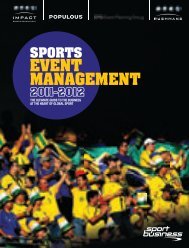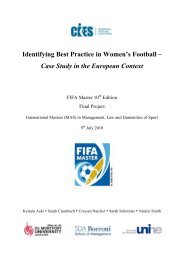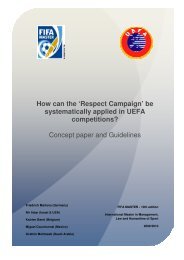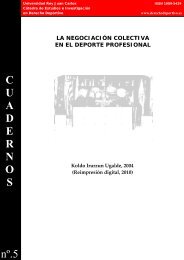01 cover sbi 152.indd - FIFA/CIES International University Network
01 cover sbi 152.indd - FIFA/CIES International University Network
01 cover sbi 152.indd - FIFA/CIES International University Network
You also want an ePaper? Increase the reach of your titles
YUMPU automatically turns print PDFs into web optimized ePapers that Google loves.
PETER HUTTON<br />
CHIEF OPERATING<br />
OFFICER, TAJ TV<br />
PAUL SAMUELS<br />
EXECUTIVE DIRECTOR,<br />
AEG SPONSORSHIP<br />
KEVIN ROBERTS<br />
EDITORIAL DIRECTOR,<br />
SPORTBUSINESS GROUP<br />
“The new format [Twenty20] has<br />
certainly led to some huge deals, but<br />
it’s also created problems for the<br />
value of the traditional game.”<br />
“Teams, governing bodies and owners<br />
are going to have to perform, behave<br />
and play by the rules - they need to<br />
make the sponsorship sell easier,<br />
not harder.”<br />
“Whenever government interferes in<br />
the sports market, something goes<br />
wrong. Just look what happened<br />
when the European Union decided<br />
Sky had to give up part of its Premier<br />
League TV package.”<br />
IT’S BEEN A TOUGH YEAR. Even the Indian<br />
cricket board rights have decreased in value. The<br />
one-off tournaments that normally spring up<br />
every month have simply failed to find buyers.<br />
Currency fluctuations in our core markets in<br />
the Indian sub-continent also played a major role.<br />
Most rights were bought in US Dollars, most<br />
income was in Indian or Pakistani rupees, whose<br />
fall increased the pressures.<br />
The Champions League cricket was the most<br />
notable economic failure. ESPN-Star’s ten year,<br />
billion dollar acquisition, failed to excite<br />
advertisers or viewers to the degree expected and<br />
has considerable ground to make up. It was<br />
perhaps a reality check for the value of Twenty20<br />
cricket. The new format has certainly led to some<br />
huge deals, but it’s also created problems for the<br />
value of the traditional game. The smaller cricket<br />
boards have now realised, perhaps too late, that<br />
the IPL’s riches are based on the same<br />
advertisers that have brought them such<br />
increases in their own incomes over the years.<br />
The current arguments over cricket’s next<br />
five-year fixture plan sum up the consequences of<br />
overcrowding in the mind of the viewer and<br />
advertiser. The actual or effective windows for the<br />
ICC or IPL based events mean that the big four<br />
boards (India, England, Australia, South Africa)<br />
increasingly just want to play each other in the<br />
few months that remain.<br />
The power base of cricket has further shifted as<br />
the likes of the West Indies or New Zealand<br />
boards became more reliant on the hand-outs<br />
and favours from the ICC or the Indian board.<br />
Away from cricket, the developments in our<br />
Middle East backyard have been fascinating. Pay<br />
TV has made no business sense in the area.<br />
Rights figures have escalated way beyond the<br />
potential income from a small pay market.<br />
Showtime and Orbit have consolidated the<br />
English speaking audiences. ART and Al-Jazeera<br />
have consolidated the major football rights.<br />
Yet, Abu Dhabi media’s purchase of the Premier<br />
League and development of a major media hub in<br />
the UAE’s capital has led to the potential<br />
emergence of a new force in the region’s<br />
television game. The Abu Dhabi decisions on<br />
distribution and future strategy may well be a<br />
story to watch in 2<strong>01</strong>0.<br />
IT IS MAJOR INCIDENTS off the pitch which have<br />
rocked sport in 2009 - from the allegations of<br />
cheating by Briatore to the Harlequins Bloodgate<br />
scandal. These incidents along with the economic<br />
downturn will have corporate organisations<br />
revaluing their sponsorship spend.<br />
This hit to sponsorship revenue streams, along<br />
with the change to the major sporting television<br />
rights, could stunt sports investment.<br />
The industry needs to weigh up whether a<br />
greater audience watching a sport will lead to<br />
more interest and excitement in that sport, and<br />
ultimately participation at grass roots level.<br />
If it doesn’t, the lack of big money which was<br />
previously poured into sporting bodies through<br />
the purchase of TV rights will be hugely<br />
detrimental. Reducing investment in this area will<br />
see a lack of development across the board - and<br />
we only have to look back at the success of<br />
Beijing to realise how much direct investment in<br />
athletes can achieve.<br />
I am strong believer in naming rights and have<br />
no doubt this will be high on the agenda in 2<strong>01</strong>0.<br />
Spurs, Everton and Liverpool have all talked<br />
about new stadiums and the selling of naming<br />
rights offers brands strong opportunities to reach<br />
new audiences - but this is still in the very early<br />
stages. With established clubs like Chelsea and<br />
Newcastle looking for potential naming rights<br />
partners, they need to take into consideration the<br />
failings of The BT Cellnet Riverside Stadium and<br />
the Friends Provident St Mary’s Stadium, which<br />
have made me wonder if some owners and<br />
management teams really understand what<br />
naming rights is all about. Sports Direct.com @ St.<br />
James Park really sums this up.<br />
Commercially it is going to be another tough<br />
year, so players, teams, governing bodies and<br />
owners are going to have to perform, behave and<br />
play by the rules - they need to make the<br />
sponsorship sell easier not harder.<br />
With greater accountability we need to<br />
demonstrate ROI and the entire industry needs to<br />
be responsible for demonstrating its effectiveness<br />
to keep us at the forefront of marketing decision<br />
maker’s minds.<br />
IT WAS, ON THE FACE OF IT, a meaningless match.<br />
A dead World Cup qualifying rubber between<br />
Ukraine and an England team which had already<br />
qualified for the finals in South Africa.<br />
In fact it was so dead that no UK broadcaster<br />
was willing to meet the asking price for the rights,<br />
an unheard of situation in a football mad nation.<br />
So up stepped digital media company Perform to<br />
stream the game live over the internet at £4.99<br />
($6.30) a pop. The move created ripples<br />
internationally. While some sports events have<br />
routinely been streamed for years, this was the<br />
first time that a webcaster had stepped in to<br />
replace the anticipated television service for a<br />
major football international in quite this way.<br />
Perform claimed an audience of around 500,000<br />
and reviews of the service were distinctly mixed.<br />
But this is a Genie which can never be put back in<br />
its bottle. It provided proof absolute that the rights<br />
market for live sport is no longer a simple<br />
competition between established broadcasters and<br />
that - for certain properties in certain<br />
circumstances - there are new kids on the block.<br />
While this provided a glimpse into the future,<br />
2009 also saw the past re-emerging in the form of<br />
fresh Listed Events recommendations in the UK.<br />
These are the sports events which have to be<br />
shown live on free-to-air television, driving a coach<br />
and horses through the notion of free competition.<br />
The England and Wales Cricket Board is furious<br />
that there are moves for its Crown jewel event - the<br />
home Ashes tests against Australia - to be<br />
returned to the free domain from Sky Sports which<br />
shows ALL its other properties….even the less<br />
popular ones... The Board reckons it may cost<br />
them £100 million which would otherwise be<br />
ploughed back into sport.<br />
Whenever a government interferes in the sports<br />
market, something goes wrong. Just look what<br />
happened when the European Union decided<br />
BSkyB had to give up part of its Premier League TV<br />
package. Fans had to pay more and Setanta<br />
couldn’t make their minority interest work. And<br />
went bust.<br />
The result... chaos and financial misery for the<br />
people in football who can least afford it. So a<br />
memo to governments re 2<strong>01</strong>0: Back Off….Please.<br />
SportBusiness <strong>International</strong> • No.152 • 12.09 71
















